

Loving the Cyber Bomb? The Dangers of Threat Inflation in Cybersecurity Policy. Over the past two years there has been a steady drumbeat of alarmist rhetoric coming out of Washington about potential catastrophic cyber threats.
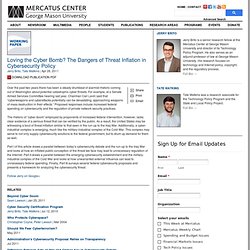
For example, at a Senate Armed Services Committee hearing last year, Chairman Carl Levin said that “cyberweapons and cyberattacks potentially can be devastating, approaching weapons of mass destruction in their effects.” Proposed responses include increased federal spending on cybersecurity and the regulation of private network security practices. The rhetoric of “cyber doom” employed by proponents of increased federal intervention, however, lacks clear evidence of a serious threat that can be verified by the public. As a result, the United States may be witnessing a bout of threat inflation similar to that seen in the run-up to the Iraq War. Additionally, a cyber-industrial complex is emerging, much like the military-industrial complex of the Cold War. Soap is crusting up sewers, but it's not the clean kind. By Elizabeth Weise, USA TODAY Updated 4/27/2011 9:38 PM | Nationwide, about 22% of sanitary sewer overflows are caused by accumulations of a hard, gucky, adhesive substance called FOG, short for "fats, oils and grease.

" A Declaration of Cyber-War. Japan, Oil and the Fragility of Globalization. 'Energy and Equity' starts today -- Andrew Nikiforuk's new weekly Tyee column about oil, energy and civilization.
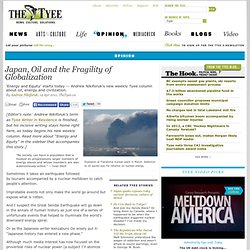
Explosion at Fukishima nuclear plant in March. Addiction to oil paved way for reliance on nuclear energy. Food and water as key ingredients of the coming civilisational eco-crisis. Excerpted from an important interview, please read it in full, by Lester Brown, interviewed by Scott Thill:
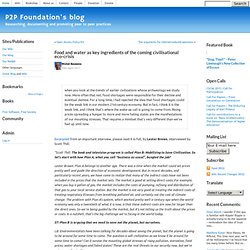
Answering the world's growing water problem. The portion of the global population living in conditions of at least moderate stress involving water – everything from conflict over access to failing traditional sources and lack of access to clean water – will rise to two-thirds by 2025.
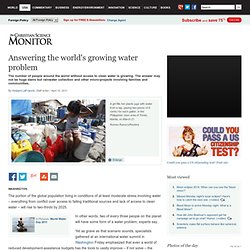
Skip to next paragraph Subscribe Today to the Monitor Click Here for your FREE 30 DAYS ofThe Christian Science MonitorWeekly Digital Edition. Coping with infrastructure backlog calls for overhaul of how costs are calculated. Public private partnerships took a king hit last week when the failed RiverCity Motorways was the object of a $700 million class action and the construction giant Leighton Holdings booked huge write-downs on its Victorian desalination scheme and its Brisbane Airport Link project.
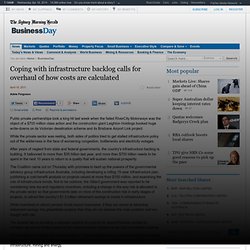
While the private sector was reeling, both sides of politics tried to get stalled infrastructure policy out of the wilderness in the face of worsening congestion, bottlenecks and electricity outages. After years of neglect from state and federal governments, the country's infrastructure backlog is building. It ballooned to more than $35 billion last year, and more than $700 billion needs to be spent in the next 10 years to return to a quality that will sustain national prosperity. Advertisement While incentives to attract pension funds sound impressive, if they are aimed at attracting retirement savings into greenfields projects then they do not address the main problem and are fraught with risk.
Japan's Disaster and the Manufacturing Meltdown. The effects of Japan’s March earthquake and tsunami are being felt far beyond the shattered region around Sendai and Fukushima.
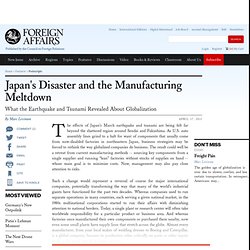
As U.S. auto assembly lines grind to a halt for want of components that usually come from now-disabled factories in northeastern Japan, business strategists may be forced to rethink the way globalized companies do business. The result could well be a retreat from current manufacturing methods -- sourcing key components from a single supplier and running “lean” factories without stocks of supplies on hand -- whose main goal is to minimize costs. Now, management may also pay close attention to risks. Such a change would represent a reversal of course for major international companies, potentially transforming the way that many of the world’s industrial giants have functioned for the past two decades. To continue reading, please log in. Don't have an account? Register Register now to get three articles each month.
Register for free to continue reading. Fukushima and Derivatives Meltdowns by Mark Roe. Exit from comment view mode.
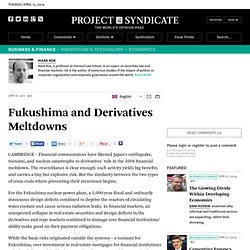
Click to hide this space CAMBRIDGE – Financial commentators have likened Japan’s earthquake, tsunami, and nuclear catastrophe to derivatives’ role in the 2008 financial meltdown. The resemblance is clear enough: each activity yields big benefits and carries a tiny but explosive risk. But the similarity between the two types of crisis ends where preventing their recurrence begins. For the Fukushima nuclear-power plant, a 1,000-year flood and ordinarily innocuous design defects combined to deprive the reactors of circulating water coolant and cause serious radiation leaks. While the basic risks originated outside the systems – a tsunami for Fukushima, over-investment in real-estate mortgages for financial institutions – design defects and bad luck meant that the system couldn’t contain the damage.
Seven Double Standards. Why don’t we judge other forms of energy generation by the standards we apply to nuclear power?
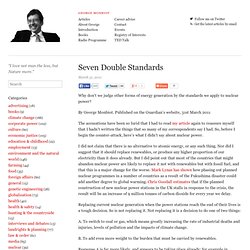
By George Monbiot. Published on the Guardian’s website, 31st March 2011 The accusations have been so lurid that I had to read my article again to reassure myself that I hadn’t written the things that so many of my correspondents say I had. So, before I begin the counter-attack, here’s what I didn’t say about nuclear power.